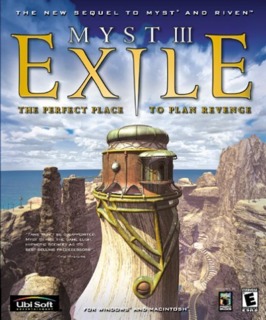Exile is a beautiful, complex and intriguing logic-puzzle adventure, and is probably the pinnacle of the Myst series.
As in previous games of Myst, you play as The Stranger, a mysterious friend of the main non-player character around whom most of the action develops, Atrus. Atrus is a member of the D'ni; a race that has the power to write books (or Ages) into which people can physically travel through and even live inside. Upon arriving at Atrus' home, you witness Atrus' latest masterwork, Releeshahn, being stolen from the study by the strangely dressed interloper Saavedro, who then escapes into another of Atrus' novels. In hot pursuit, you follow Saavedro through the pages, chasing him through several different Ages with the ultimate aim of getting Atrus' book back for him. Whilst at some points the plot can feel rather thin and underdeveloped, when it actually gets going it can be highly engaging. The emotional core is supported by some excellent if occasionally melodramatic acting from Brad Dourif, who is most well known in cinema for playing Wormtongue in "The Lord of the Rings: The Two Towers", as well as Billy Bibbit in the classic "One Flew Over the Cuckoo's Nest". All of the characters appear in-game through full-motion video blue screen performances, and although there are only a couple of these cutscenes in the game, they are interesting enough to pique your interest.
Most of the actual gameplay of Exile involves the use of the standard, tried and tested point-and-click traversal of 360 degree static, pre-rendered environments in a station-to-station format. You will then need to interact with the environment in various ways in order to solve a number of spatial and logic puzzles, which unlock new locations and allow you to progress with the story. These environments are lovingly detailed and beautifully portrayed, despite the game's relative age. Although there is minimal genuine animation, each world manages to have its own unique and atmospheric feel. Edanna for example is an entirely naturalistic world, filled with plants and giant trees and a number of fantastical looking animals, whilst Voltaic is a dusty and industrial landscape, complete with faulty electrical wiring, improvised hydraulics dams and airships. It is really the absolute beauty of Exile that helps to lend it lasting appeal in video game history. Although all of the scenes are pre-rendered, there is something magnificent and yet desolate about standing on a rock outcrop, gazing at a sweeping ivory tower emerging from the water. Despite the limitations of the point-and-click interface, this is a game that manages to closer than ever to making it feel like you are really in the world you are exploring.
The puzzles themselves are highly varied, and almost always extremely fiendish. Most of the worlds you visit involve solving several minor puzzles which will allow you access to the key puzzle in that world, before you return to the hub world of J'nanin in order to move on. Without a game guide, complex puzzles of this nature are sure to leave some players scratching their heads in dismay, but successfully solving a puzzle brings with it a great sense of accomplishment, and usually the game will also reward you with some kind of graphical animation demonstrating what the outcome of your action was. There are one or two puzzles which are perhaps too confusing, notably one where you must fill an airship with precisely the correct pressure of air, but these are normally the exception to the rule. A bit of lateral thinking and having a pen and paper handy are usually all that is required to pass most challenges and the nature of the game means that if you fail, you have ample opportunity to try again.
Most of the games rich atmosphere however comes from the brilliant sound design, which is frankly second to none. A mixture of highly appropriate ambient sound effects and a simply mesmerising orchestral score from Jack Wall combine to give the game a presence that is irreplaceable. The music shifts gently to suit each location, and the sound effects, from the whistling of the wind through a canyon or the gentle tinkle of wind chimes set the tone for what you are likely to see or experience. Musically the sound is both epic and mysterious, evoking everything which Myst should stand for. It cannot be overstated how effortlessly engrossing the sounds of Exile immerse you within the landscape. Certainly, this is a game to either play with headphones on, or else with the volume cranked up.
Myst III: Exile essentially marks the beginning of the end of node-based movement systems as a viable gameplay mechanic. Although Myst IV: Revelation would continue to use the same system several years later, Myst V: End of Ages went fully real-time with 3D graphics, and Uru continued with the new system. The original Myst certainly revolutionised adventure gaming when it first came out, but the games following Riven never really gained the mass consumer appeal they once held. Exile is certainly one of the most beautiful and best sounding games you are ever likely to play, and if you can fathom the relatively complex puzzles, it will keep you enthralled. I for one hope that adventure games of this calibre and artistic standard will continue to be made long into the future.

